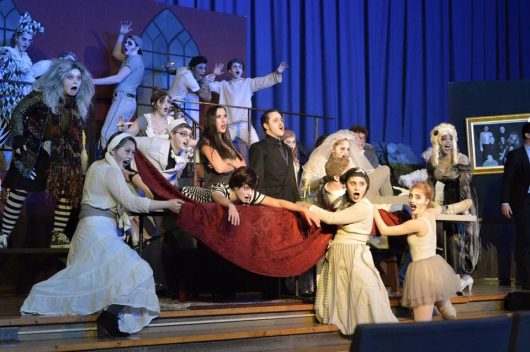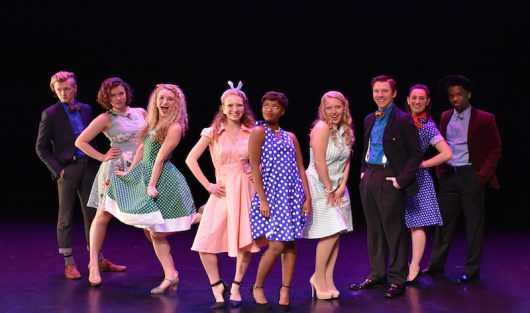
Student organization Off the Lake Productions performed its spring musical in Hitchcock Hall. Credit: Courtesy of Off the Lake Productions
When Sarah Neville founded the Lord Denney’s Players, an on-campus theater group housed within the Department of English, she planned to find a venue on campus for the group to perform.
Instead, she found herself searching Columbus for a theater where her group of Shakespearean actors could showcase their talents.
In February, LDP produced its rendition of Shakespeare’s “The Tempest” at the Van Fleet Theater downtown, which Neville said was due to the lack of available theater space on campus for communal use. She said it had a negative impact on the show because they had to use the group’s budget to rent the space, coordinate transportation for the cast and crew to get to the venue and ask student audiences to travel downtown.
Neville said although there are theaters on-campus, such as the Thurber Theatre in the Drake Performance & Event Center and Mershon Auditorium, they are either used for instructional purposes or are not of appropriate size. This forces groups such as LDP to use any space available to perform — even classrooms.
“We can put on a show in our English department main room, which is Denney 311, and we’ve done that, but that’s not a room for watching things,” Neville said. “That’s a room for having a meeting in.”
Neville said classrooms don’t have the appropriate sound, lighting and seating components to put on a theatrical performance.
“A performance space comes and there’s an assumption that you’re going to be able to alter the lights and sound, so there’s a technical component to that space,” Neville said. “There’s a sound board, a sound system and a lighting board and a lighting system and the ability to manipulate and change those things. A performance space has, usually, raked seating. It has acoustics that are designed for people to be heard without being mic’d.”
Neville said a good place to add open theater space would be near 15th and High, as part of the Framework 2.0 project. Although planning for the project is still in the early stages and it is not decided yet, Libby Eckhardt, a spokesperson for the College of Arts and Sciences said adding such space is a goal of the project.
“Performance spaces on campus are in high demand; departmental coursework and curricular requirements take precedent for scheduling,” Eckhardt said in a statement. “Arts District planning is in its early stages — an architect has not yet been engaged —and specifics of programming and scheduling will be addressed in the design phase, although the creation of more mixed-use and flexible spaces is a key goal.”

Brandon Adam’s senior show “Extravaganza” was performed off-campus at Red Club due to lack of available performance space on campus. Credit: Courtesy of Laura DeAngelis
Brandon Adams, a fourth-year in dance, recently produced his senior dance show. Although the show was part of his major’s curriculum, he was forced to make arrangements to have the show off-campus after being unable to secure a space on campus. He said having to pay for an off-campus venue decreased the number of attendees because he had to charge a ticket fee.
Adams said having open theater space would “mean the world” to him and other students whose majors are based around performance. He said students learn a lot about theory in the classroom and have studios to work on different skills, but the opportunities to perform are limited due to the lack of open space.
“I think that the professionalism and the rigor of performing a show, like if we were to have a space on campus or a space near campus that allows for students and organizations to perform more often, I think it would really give us a leg up in the world of performing,” Adams said. “As a performer, you have to have stage time.”
Alex Brandt is a third-year in middle childhood education and the co-president of Off the Lake Productions, the largest theater student organization on campus. He said the group could benefit from on-campus theater facilities. Although the organization is OK with the facilities they use now, he said they would love to have an opportunity to grow.
“Right now, we use Hitchcock Hall (for performances) because that’s what we have,” Brandt said. “We don’t mind using Hitchcock because we have developed a par so we’re good using it. The biggest thing is we’re hindered by what you can do in that space. So, we’ve made it work but in years to come, we want to grow just like all student orgs.”
Adams said even if a theater space on-campus isn’t in the near future, he has a plan of his own to create a space where people can showcase their artistic talents near campus.
“As someone who is about to graduate, I am interested in actually opening up a space that is more-so a theatrical bar near campus, and I am hoping with that happening, I can allow people to have a space to do such things,” Adams said. “We have amazing bands, artists from visual arts to performing around here on campus and there’s just no place to catch all of that in one space and I’m hoping that if not me, somebody creates a place where that can happen.”


